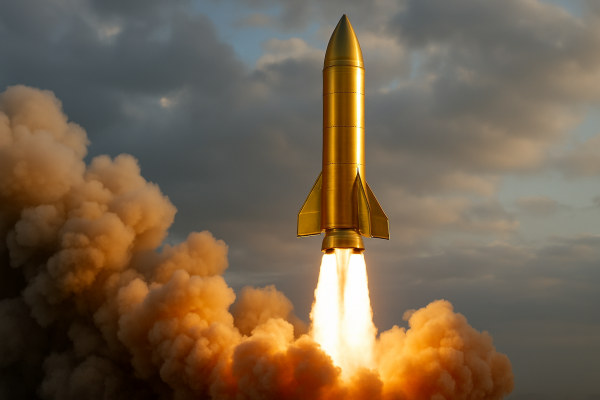March 9th, 2022 | 11:11 CET
McDonald's, Barsele Minerals, ING Group - Golden instead of Chicken McNugget
The crisis currency gold has already marked new all-time highs in the euro currency. In the case of the dollar, the precious metal moved above the psychologically important USD 2,000 mark, at least briefly. From a technical perspective, the next target is the high at USD 2,074.40. Various companies currently have entirely different concerns with regard to their high exposure to Russia. In contrast to other competitors, fast-food giant McDonald's is being hit extremely hard.
time to read: 3 minutes
|
Author:
Stefan Feulner
ISIN:
MCDONALDS CORP. DL-_01 | US5801351017 , BARSELE MINERALS | CA0688921083 , ING GROEP NV EO -_01 | NL0011821202
Table of contents:

"[...] We quickly learned that the tailings are high-grade, often as high as 20 grams of gold per tonne; because they are produced by artisanal miners, local miners who use outdated technology for gold production. [...]" Ryan Jackson, CEO, Newlox Gold Ventures Corp.
Author
Stefan Feulner
The native Franconian has more than 20 years of stock exchange experience and a broadly diversified network.
He is passionate about analyzing a wide variety of business models and investigating new trends.
Tag cloud
Shares cloud
When will the breakout come?
The ongoing tensions due to the war between Russia and Ukraine pushed gold above the prominent USD 2,000 per ounce mark for the first time since September 2020. Gold producers from the first tier, such as Barrick Gold, Newmont and Yamana Gold, recorded price gains of more than 20% but are still further away from their highs than the base value. So far, attractive second-tier exploration companies have not benefited much from the current situation.
For example, Barsele Minerals, which has a joint venture with the major Agnico Eagle in Scandinavia, is quoted at CAD 0.46 on its home market in Toronto, which means EUR 0.34 in Frankfurt. Yet the potential of this joint partnership in northern Sweden is many times greater. The Barsele property covers 34,500 hectares in the Fennoscandian Shield and has a potential of more than 5 million ounces of gold, according to Belcarra Group executives who run Barsele Minerals. Back in 2016, the Royal Bank of Canada (RBC) conducted a valuation of the Barsele Gold Project for Agnico Eagle. At a gold price of below USD 1,350 at the time, the experts calculated a value of USD 375 million.
Is the giant making a grab?
Agnico Eagle, as the main shareholder with a 55% stake, is driving exploration and drilled a total of 155,000 meters and 404 holes. Recent exploration found a high-grade boulder grading 90.8 g/t Au to the northwest along a known boulder stream discovered in 2016. Based on this, it is believed to be similar to the other boulders found in the area. If the drill results continue to be positive, the gold giant is likely to grab the entire gold project; the potential of the Scandinavian project is too great. However, this offer should then move to other spheres.
Heavy losses, loud criticism
Pressure is mounting on Western food and beverage giants to pull out of Russia because of the invasion of Ukraine. McDonald's and Coca-Cola have already been criticized on social media for not speaking out about the attacks and continuing to operate in Russia. Other US brands such as Netflix and Levi's have already suspended sales or stopped providing services in Russia.
The presence in Russia and Ukraine has put McDonald's shares under heavy pressure. Thus, the fast-food giant lost almost 20% recently and fell below the important 200-day line. Burgers are sold at around 847 outlets in Russia alone, accounting for about 2% of total sales and 3% of operating profit. Unlike other fast-food chains, which franchisees mainly operate, the Americans own most of the real estate. There would be great danger if the conflict were to spill over into the rest of Europe. The European continent accounts for nearly a quarter of McDonald's system-wide sales.
ING Group - Defaults loom
The major Dutch bank ING Group is also currently worried about its exposure to Russia and is feeling the effects of the sanctions against Russian companies and individuals. Outstanding loans with a volume of around EUR 700 million are affected, ING announced on Friday. In Ukraine, ING has outstanding loans in the amount of EUR 500 million. In Russia, the amount is EUR 5.3 billion, it said. However, the SWIFT exclusion is not currently affecting the bank, it said. All told, the exposure in both countries combined thus amounts to 1% of ING Group's loan book as of February 28, according to a company statement, with 0.9% relating to Russia and 0.1% to Ukraine. According to the Company, only wholesale banking, i.e. business with companies, is affected.
By sector, most loans have gone to mining and metals companies (37%), followed by companies from the energy sector (18%). In Ukraine, most outstanding loans have gone to agricultural and food companies (62%). With a 40% discount, the Dutch lost even more value than their German counterparts, Deutsche Bank and Commerzbank. Before investing, it is advisable to let calm prevail.
The stock markets are collapsing due to the Ukraine conflict, especially financial stocks such as ING Group and Deutsche Bank are losing significantly. Before investing, one should first wait for an easing of the situation. In contrast, second-tier gold stocks such as Barsele Minerals have potential.
Conflict of interest
Pursuant to §85 of the German Securities Trading Act (WpHG), we point out that Apaton Finance GmbH as well as partners, authors or employees of Apaton Finance GmbH (hereinafter referred to as "Relevant Persons") may hold shares or other financial instruments of the aforementioned companies in the future or may bet on rising or falling prices and thus a conflict of interest may arise in the future. The Relevant Persons reserve the right to buy or sell shares or other financial instruments of the Company at any time (hereinafter each a "Transaction"). Transactions may, under certain circumstances, influence the respective price of the shares or other financial instruments of the Company.
In addition, Apaton Finance GmbH is active in the context of the preparation and publication of the reporting in paid contractual relationships.
For this reason, there is a concrete conflict of interest.
The above information on existing conflicts of interest applies to all types and forms of publication used by Apaton Finance GmbH for publications on companies.
Risk notice
Apaton Finance GmbH offers editors, agencies and companies the opportunity to publish commentaries, interviews, summaries, news and the like on news.financial. These contents are exclusively for the information of the readers and do not represent any call to action or recommendations, neither explicitly nor implicitly they are to be understood as an assurance of possible price developments. The contents do not replace individual expert investment advice and do not constitute an offer to sell the discussed share(s) or other financial instruments, nor an invitation to buy or sell such.
The content is expressly not a financial analysis, but a journalistic or advertising text. Readers or users who make investment decisions or carry out transactions on the basis of the information provided here do so entirely at their own risk. No contractual relationship is established between Apaton Finance GmbH and its readers or the users of its offers, as our information only refers to the company and not to the investment decision of the reader or user.
The acquisition of financial instruments involves high risks, which can lead to the total loss of the invested capital. The information published by Apaton Finance GmbH and its authors is based on careful research. Nevertheless, no liability is assumed for financial losses or a content-related guarantee for the topicality, correctness, appropriateness and completeness of the content provided here. Please also note our Terms of use.




